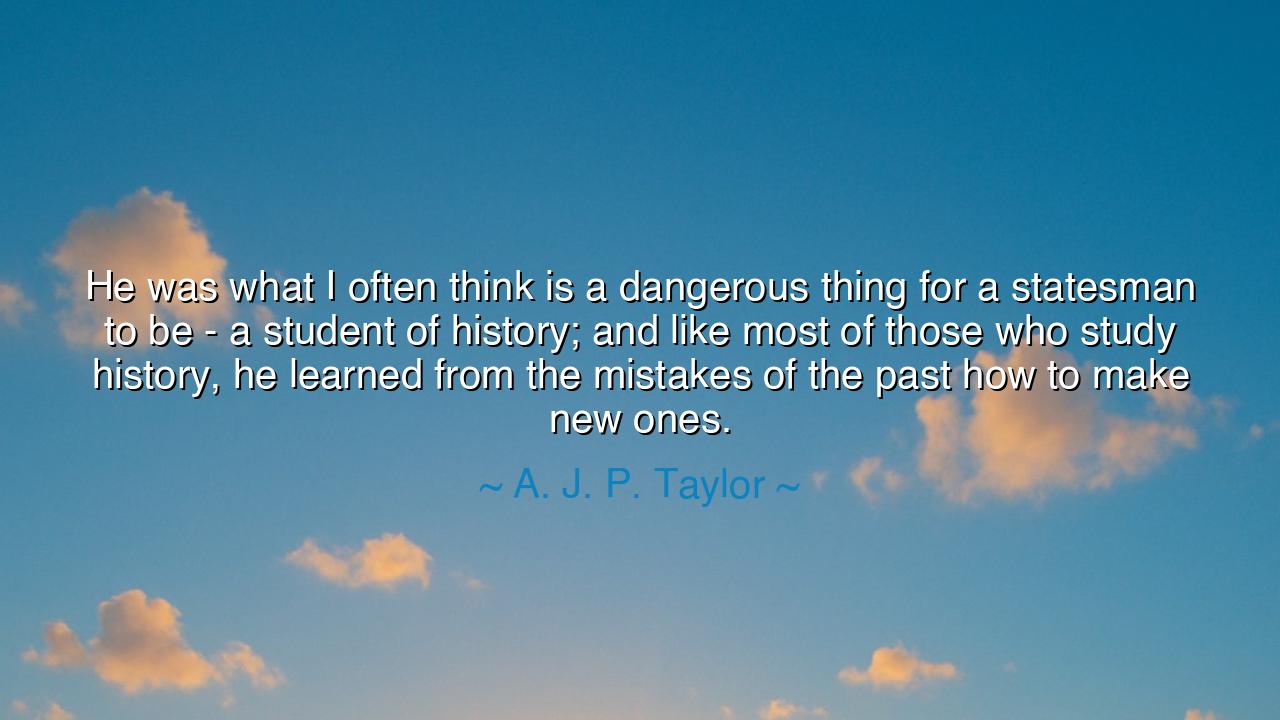
He was what I often think is a dangerous thing for a statesman to
He was what I often think is a dangerous thing for a statesman to be - a student of history; and like most of those who study history, he learned from the mistakes of the past how to make new ones.






“He was what I often think is a dangerous thing for a statesman to be — a student of history; and like most of those who study history, he learned from the mistakes of the past how to make new ones.” – A. J. P. Taylor
In these words, the British historian A. J. P. Taylor, master of irony and truth, casts a sharp light upon one of humanity’s most enduring paradoxes — that knowledge of history does not always lead to wisdom. His statement, veiled in wit but heavy with warning, reminds us that even the most learned among us are not immune to folly. To study the past, he says, is not to escape its errors but, too often, to repeat them in disguise. For the student of history, armed with intellect yet lacking humility, may believe himself master of destiny — when in truth, he is merely rearranging old tragedies in new costumes.
The origin of this quote lies in Taylor’s reflections on the statesmen of his own age, particularly those who shaped the modern world through war and diplomacy. Writing in the aftermath of the World Wars, Taylor had witnessed the arrogance of leaders who claimed to have learned from history — and yet marched their nations into catastrophe once more. His words echo like a sigh through the corridors of power: a reminder that the mere study of the past is not salvation; it is wisdom misunderstood that leads men astray. The past must be understood not as a manual to follow, but as a mirror to see oneself truly — and therein lies the danger.
When Taylor speaks of a “dangerous thing for a statesman to be,” he points to the pride that knowledge can breed. The one who studies history often sees patterns and believes he can outwit them. Yet the world is not the same river twice, and human hearts never repeat their rhythm exactly. The clever statesman, seeking to avoid yesterday’s disaster, builds new disasters upon new foundations. One might recall the Treaty of Versailles after the First World War — a lesson drawn from the arrogance of empire and meant to ensure peace. Yet in punishing Germany with humiliation and debt, it planted the seeds of a greater and more terrible war. Those who crafted it believed they had learned from the past; in truth, they had merely changed the shape of the suffering.
History is full of such examples. Consider Napoleon Bonaparte, who read deeply of the Roman emperors and the conquests of Alexander the Great. He believed he had deciphered the code of power, the rhythm of empire. Yet in retracing their steps, he met their same fate — glory followed by ruin, ambition followed by exile. Like those before him, Napoleon’s brilliance became his blindness. He learned the lessons of Caesar’s boldness but not of his fall; he admired Rome’s grandeur but ignored its decay. Thus, Taylor’s words remind us that the lessons of history cannot simply be learned — they must be understood with humility, for the past is not a map, but a warning written in smoke.
And yet, there is a tragic beauty in this cycle of learning and error. For it reveals the eternal restlessness of the human spirit — our refusal to remain still, our hunger to create, to improve, to challenge even the wisdom of our ancestors. The student of history who errs anew is not merely foolish; he is also human. Each age must make its own mistakes, for the conditions of the world are ever-changing. The danger, however, lies in forgetting this truth — in believing that intelligence alone, or education alone, can perfect our nature. Taylor, like an ancient sage, reminds us that knowledge without humility is the seed of ruin, and that arrogance wrapped in intellect is the most seductive of all poisons.
So what lesson, then, shall we take from these words of irony and wisdom? It is this: to study history not as conquerors, but as pilgrims. Let the past humble you, not empower you. Let it speak, not to your ambition, but to your conscience. When you look upon the ruins of fallen empires, do not ask, “How might I do better?” but rather, “How might I not repeat the same blindness?” Remember that every age believed itself wiser than the last — and that every age has fallen in its own way. The true student of history is not the one who seeks to command it, but the one who listens to its silence.
And so, my child of reason and remembrance, walk gently in the halls of history. Let its echoes teach you reverence for the human struggle — not mastery over it. For in the end, the wisdom of Taylor stands eternal: the past may instruct, but it cannot save. Only humility — that quiet guardian of the soul — can turn knowledge into insight. Without it, even the wisest will continue to “learn from the mistakes of the past how to make new ones.” Yet with it, perhaps one day, we will learn not only from history — but from the living truth of our own hearts.






AAdministratorAdministrator
Welcome, honored guests. Please leave a comment, we will respond soon